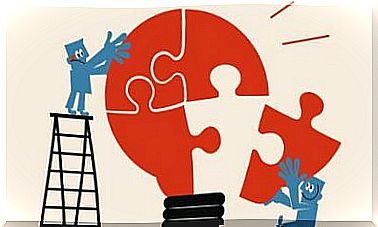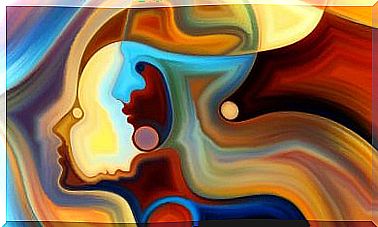Jealousy, Devaluation And Disbelief: How Are They Related?

Unlike envy, which involves two people, jealousy occurs in a triangular dynamic in which the second person involved believes that the first person forms a bond with a third (real or imagined). This situation sometimes triggers the “wildest instincts” of the second person.
In a relationship, unless she is certain her partner is unfaithful, the jealous person is overwhelmed by a feeling of worthlessness. She is suspicious, does not feel safe and is afraid of being abandoned. She also feels anger, which covers her anguish and sadness. In fact, it’s not a real situation that makes her suffer, but what she imagines. Concretely, it is her mental ruminations, ideas that pursue her, that affect her.
Problems related to jealousy are one of the main reasons to see a psychologist. Although the reason many patients turn to therapy is different, jealousy is often present, making the situation worse.
A jealous person ends up having lots of ideas about how their partner can cheat on them. His imaginative wealth is such that, to justify his excessive jealousy, he tells himself stories that are true plots of infidelity.
All recriminations contain a flowery idea about the activities that the spouse could develop in the fantasized infidelity:
- “You were late because you were definitely talking to your client.”
- “What were you doing so late at work?”
- “Since when are you so interested in your neighbor?”

Lovers also support a marriage
The third person in this triad does not always cause the relationship to be destroyed. Sometimes, she even manages to support it. Faced with the instability of the relationship, the lover decompresses the relationship and the couple’s crisis is momentarily blurred.
However, this is not a solution. The lover is not always a being of flesh and blood; it can be work, parties, sports, television, meeting friends, hobbies , studies, etc.
One can compile a collection of jealousy stories, but the triad mechanism essentially involves a spouse suspicious of their partner due to the existence of a lover who may be a real person.
The first person, through this alliance, becomes the object of desire and value of the second. The second is the one that is devalued. If there are valued people (the first and the third), they exist as long as there is a devalued one (the second), who are dominated by various feelings, including helplessness, rejection, defamation, and aggression.
Jealousy is based on devaluation. A jealous person has low self-esteem. A person who loves herself and feels good about herself has no reason to fantasize that her partner might cheat on her.
It is possible that the husband is very seductive with other women, spends a lot of time on his hobbies and playing sports, etc. It is possible that a woman flirts with other men, goes out a lot, or spends a lot of time at work. In these very specific cases, there are good reasons to suspect infidelity.
A person with healthy self-esteem does not believe that their partner can value another. In fact, she believes their relationship is the best thing that can happen to her and that they both don’t need to look for anything else outside of the relationship. It is not a question of denying, but of valuing. These are very different concepts and mechanisms.
In short, in this interactional dynamism, the second person fantasizes that the first is with a third. This means that she values, loves, desires, and takes the former into consideration. It also means that she becomes inferior in the relationship. From there, feelings of devaluation and insecurity are born that gradually undermine their self-esteem.
The person suffering from jealousy is incredulous
Attempts to solve the problem reinforce the picture. The more the first person tries to convince the second that they are wrong in their assessments, the less credible they become. The second, incredulous and full of anger, has no doubt that the first has something to do with a third. She, therefore, does not want to be convinced first.
The first will cover the second with praise to try to value it. But these words are unreliable for the second. That way it confuses the rest of the system.
The alleys of jealous people
The jealousy mechanism tends to create alleys and not provide answers . We observe self-fulfilling prophecies: the jealous person’s hypotheses come true.
- If the first person says these accusations are not true and rejects the second person’s accusations, the second person will tell himself that the first person is lying.
- If the first one doesn’t respond, the second one will think she didn’t say anything because she’s hiding something.
- And if the first responds with a caress or saying I love you, it will be suspected of seduction and evasion.
In short, whatever the answer of the first, it will only confirm the initial hypothesis of the second. There is no right answer. Nothing will have credibility for the person suffering from jealousy.
A jealous and insecure wife fantasizes that her husband looks at his new secretary. She starts calling him at the office insistently and obsessively controlling her schedule. Getting home fifteen minutes longer than usual can trigger a relationship crisis with allegations and accusations of infidelity.
This situation repeats itself over time. He feels so overwhelmed in his relationship that he starts looking for something better out of it. He comes home later and later, spends a lot of time at work, goes out with his friends more and more for drinks, and plans a dinner with his old college buddies.
This time away from home is fertile ground for his wife’s fantasies, which now confirm her certainty that her husband is cheating on her. She has turned into a hostile “witch” who devalues him and makes him feel like a fool. This is because one of the resources of the damaged and devalued person is to devalue the other in the same way.

Jealousy, fights and violence
Jealousy leads to arguments and confrontations. Partners believe they are trying to find each other through communication, but they are not. So the scream appears in the form of a paradox; physically they are very close, but internally they are very far away, so far away that they need to yell at each other to communicate.
Despite their best efforts, they continue to give orders and set expectations that the other cannot fulfill, piling up frustrations for both of them. And in this pathological confrontation, the distance only increases.
This is how the couple navigates between rivalries and conflicts, jealousy and projections, rationalizations and contaminations, between ideals and disappointments, between needs and needs. With this burden, the partners, who find themselves in the middle of a pitched battle, become exhausted and tense.
When violence is present in the relationship
Violence can affect the relationship when, for example, the words in a discussion fail and one of the interlocutors plunges into the most acute frustration. He can then try to master the situation using physical force.
Once verbal and physical violence occurs, the abuser feels guilty. The victim forgives him and there is a period of apparent calm. However, at some point, a new circle of violence will break out. The aggressor resorts to the “hands” more and more easily.
Let’s take an example: With all the warnings he suffers, the husband keeps trying to get away from spending more and more hours at work. This makes his wife put more pressure on him. This is a vicious circle that has come to fruition. Both spouses became two devalued “poor things”.
One morning he arrives at work and a colleague says, “Good morning, how elegant you are today!” Their eyes light up and hearts are drawn in the air, like cartoons. Someone noticed him, and without disqualifying him! This could be the beginning of a real infidelity arising from a fantasy. It is a self-fulfilling prophecy.
Jealousy is an insult to trust and a compliment to lying. In functional couples, fluid communication involves showing your personal vulnerabilities without blaming the other for your own weaknesses.
However, it also involves valuing yourself in addition to your partner. It’s about seeing yourself in the other’s eyes and seeing the other’s gaze on yourself. It is to value to be valued.








